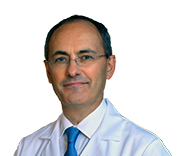Dr. Matthew Ellis, MD, Ph.D., is a top physician who sees breast cancer patients every week, as well as a scientist working at the forefront of understanding the genomics of breast cancer. He literally translates his laboratory knowledge directly into patient care every day.
He is known for his pioneering research in the pre-surgical treatment of breast cancer; he has developed treatment regimens that are being increasingly used worldwide. In 2014, he moved from Washington University in St. Louis to become the director of the Lester and Sue Smith Breast Center at Baylor College of Medicine in Houston, with the help of a CPRIT Established Investigator Award.
Read More
Dr. Matthew Ellis, MD, Ph.D., is a top physician who sees breast cancer patients every week, as well as a scientist working at the forefront of understanding the genomics of breast cancer. He literally translates his laboratory knowledge directly into patient care every day.
He is known for his pioneering research in the pre-surgical treatment of breast cancer; he has developed treatment regimens that are being increasingly used worldwide. In 2014, he moved from Washington University in St. Louis to become the director of the Lester and Sue Smith Breast Center at Baylor College of Medicine in Houston, with the help of a CPRIT Established Investigator Award.
Every breast cancer is different, made up of a number of genetic mutations at the start of the tumor’s progression, and which change over time in response to treatment. The future of breast cancer treatment is increasingly personalized medicine, and Dr. Ellis’s research is on the cutting edge.
“We need to improve our classifications and diagnostic tools for breast cancer,” he says. “There are many medications that could potentially be used, but we have trouble matching these drugs with the individuals who could best benefit from them.” Dr. Ellis is creating a publicly available database of genetic mutations that are present in breast cancer, correlated with the treatments that work best for each type.
He recently published in Cancer Discovery (August 2017) a major discovery about endocrine-receptor–positive breast cancers that are initially resistant to hormone therapy. These cancers, which make up about 20% of the breast cancers that are endocrine-receptor positive, usually mean a poor prognosis for patients. Dr. Ellis found that these tumors have a specific defect in a DNA repair mechanism that makes them resistant to traditional therapy.
The good news is that many patients with these types of cancers can be successfully treated with a new class of drugs, called cyclin-dependent kinase inhibitors. This medication is expensive, about $100,000 a year. Because these drugs do not have precise tests to guide their use, physicians are prescribing them to many patients, not all of whom will need them. Dr. Ellis’s research suggests many patients don’t need these drugs, but the ones who do, really benefit.
“Knowing which patients really require these drugs could lead to much more cost-effective and targeted treatment,” he said. “It’s potentially a huge advantage from the perspective of healthcare dollars wisely spent.”
Dr. Ellis and a colleague, Dr. Bing Zhang, also received $11 million in federal funding to start a new center at Baylor to unite the genomics of breast cancer with understanding the proteins that mutated genes code for. This cutting-edge proteogenomics center is the first of its kind in Texas.
Despite his recent experiences with Hurricane Harvey, Dr. Ellis remains very happy with his decision to move to Houston with CPRIT’s investment. “Baylor College of Medicine is really an extraordinary institution,” he says. “It’s one of the largest broad-based medical research institutions in the U.S., with first-rate core facilities and a cadre of basic scientists that can help physician-scientists like me understand their data.”
Dr. Ellis studied Medicine at Queen’s College and the Clinical Medical School at the University of Cambridge and at the Royal Postgraduate Medical School in London, receiving his Ph.D. from the University of London. He conducted research and practiced breast oncology at Georgetown University and Duke University before joining the faculty at Washington University in 2003.
Read Less

